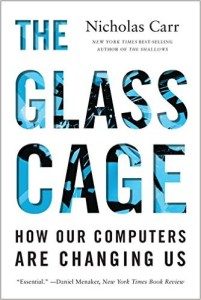 Computers perform a lot of tasks that we used to do manually and continue to take over more of the things we do every day. We use computers to perform basic arithmetic operations for us. They check and even auto-correct our spelling mistakes (not always as intended). Google reads maps for us, gives us directions, and even tells us when we’ll arrive based on traffic conditions. Computers can fly planes. They can drive cars. They can even perform many simple, and even some complex medical operations.
Computers perform a lot of tasks that we used to do manually and continue to take over more of the things we do every day. We use computers to perform basic arithmetic operations for us. They check and even auto-correct our spelling mistakes (not always as intended). Google reads maps for us, gives us directions, and even tells us when we’ll arrive based on traffic conditions. Computers can fly planes. They can drive cars. They can even perform many simple, and even some complex medical operations.
In the book The Glass Cage: How Our Computers Are Changing Us, Nicholas Carr examines the role computers play in our lives and asks an important question: What are the impacts and consequences of the growing levels of automation on our behaviors, learning, and overall development as humans?
When automation distances us from our work, when it gets between us and the world, it erases the artistry from our lives.
The above quote is one of many power observations that Carr makes in The Glass Cage showing how automation is effectively de-humanizing us. He looks at a variety of tasks, such as driving a car, flying a plane, and creating software. In each case, he examines how the computer not only helps us with those tasks, but how it ends up taking them over. He looks at how people become disconnected from reality through automation and the profound effects it can have. It separates us from the real world such that when things do go wrong, and inevitably they will since the computer operates using human generated programs, we do not have the capability to correct. As he observes:
Without lots of practice, lots of repetition and rehearsal of a skill in different circumstances, you and your brain will never get really good at anything, at least not anything complicated. And without continuing practice, any talent you do achieve will get rusty.
In a conversation with Carr in the book, veteran Google software developer Vivek Haldar makes a great point – “Sharp tools, dull minds.”
My only critique of The Glass Cage is that it can feel a bit text book-ish at times, but that does not diminish the importance of the message. While I’m not going to add it to my Must Reads, it is a must read for anyone interested in artificial intelligence and how technology is shaping our interactions with the world around us.
Carr’s message is powerful, one that must be taken to heart, and one that must be spread. While computers and the underlying software powering them is enabling advancements in the world around us, it is also inhibiting our ability to be human. Let’s face it, being human is a messy business. We make mistakes. We learn from our experiences. When the computer takes that away from us, we lose a little bit of who we are. Instead of relying on the computer to be our masters and do everything for us, we should be using the computer as an aid, an assistant. We should have a better understanding of how things work in the real world and not allow the computer to abstract it from us. In Carr’s words
Automation severs ends from means. It makes getting what we want easier, but it distances us from the work of knowing.
Bottom line, when we are not reliant on the computer to do everything for us, we learn how to more effectively interact with the world around us. We understand how and why things work the way they do. We get to experience more of our our environment and live a fuller life. And above all, we grow as human beings and become better people.
The computers have made and continue to make it easy for us to let go. They make it easy for us to turn over control of our lives. Carr should be commended for showing us that we need to be careful what we wish for. Because when we allow the computers to take over, we lose a little of who we are and, more importantly, who we can become.

Pingback: My 2018 reading list - Gregg Borodaty